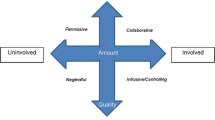Abstract
Management of type 1 diabetes (T1D) involves balancing several components including diet, exercise, and medication. Peer involvement in management tasks is an important, but understudied, issue in T1D. This study presents results of a preliminary examination of perceptions of disease management in youth with T1D and their peers. Data were collected using a mixed methods (qualitative and quantitative data) approach during medical education time at a camp for youth with T1D and their peers. Results suggest that both youth with T1D and their peers believe that peers need more information about medical consequences of having diabetes. Further, youth with T1D and their peers would like coaching on how peers may help the child with T1D manage their illness better. Results provide preliminary ideas for intervention (i.e., including peers, assessing social support) in the medical setting as well as ideas for future research (i.e., examining relationships among perceptions and gender, time since diagnosis).
Similar content being viewed by others
References
Amiel, S. A., Sherwin, R. S., Simonson, D. C., Lauritano, A. A., & Tamborlane, W. V. (1986). Impaired insulin action in puberty: A contributing factor to poor glycemic control in adolescents with diabetes. New England Journal of Medicine, 315, 215–219.
Bearman, K. J., & La Greca, A. M. (2002). Assessing friend support of adolescents’ diabetes care: The Diabetes Social Support Questionnaire-Friends Version. Journal of Pediatric Psychology, 27, 417–428. doi:10.1093/jpepsy/27.5.417.
Centers for Disease Control and Prevention. (2007). National diabetes fact sheet: General information and national estimates on diabetes in the United States. Atlanta, GA: Department of Health and Human Services, Centers for Disease Control and Prevention.
Collins, W. A., Gleason, T., & Sesma, A. (1997). Internalization, autonomy, and relationships: Development during adolescence. In J. E. Grusec & L. Kuczynski (Eds.), Parenting and children’s internalization of values: A handbook of contemporary theory. New York: Wiley.
Delameter, A. M., Smith, J. A., Kurtz, S. M., & White, N. H. (1988). Dietary skills and adherence in children with insulin-dependent diabetes mellitus. Diabetes Educator, 14, 33–36. doi:10.1177/014572178801400113.
Greco, P., Shroff-Pendley, J., McDonell, K., & Reeves, G. (2001). A peer group intervention for adolescents with type 1 diabetes and their best friends. Journal of Pediatric Psychology, 26, 485–490. doi:10.1093/jpepsy/26.8.485.
Hains, A. A., Berlin, K. S., Davies, W. H., Parton, E. A., & Alemzadeh, R. (2006). Attributions of adolescents with type 1 diabetes in social situations: Relationship with expected adherence, diabetes stress, and metabolic control. Diabetes Care, 29, 818–822. doi:10.2337/diacare.29.04.06.dc05-1828.
Heary, C. M., & Hennessy, E. (2002). The use of focus group interviews in pediatric health care research. Journal of Pediatric Psychology, 27, 47–57. doi:10.1093/jpepsy/27.1.47.
Helgeson, V. S., Reynolds, K. A., Escobar, O., Siminerio, L., & Becker, D. (2007). Role of friendship in the lives of male and female adolescents: Does diabetes make a difference? Journal of Adolescent Health, 40, 36–43. doi:10.1016/j.jadohealth.2006.07.007.
Hoffman, R. P. (2002). Adolescent adherence in type I diabetes. Comprehensive Therapy, 28, 128–133. doi:10.1007/s12019-002-0050-8.
Kovacs, M., Goldston, D., Obrosky, D. S., & Bonar, L. K. (1997). Psychiatric disorders in youths with IDDM: Rates and risk factors. Diabetes Care, 20, 36–44. doi:10.2337/diacare.20.1.36.
Krahn, G. L., & Eisert, D. (2000). Qualitiative methods in clinical psychology. In D. Drotar (Ed.), Handbook of research in pediatric and clinical child psychology: Practice strategies and methods (pp. 145–164). New York, NY: Kluwer Academic/Plenum Publishers.
La Greca, A. M. (1992). Peer influences in pediatric chronic illness: An update. Journal of Pediatric Psychology, 17, 775–784. doi:10.1093/jpepsy/17.6.775.
La Greca, A. M., Auslander, W. F., Grecco, P., Spetter, D., Fisher, E. B., & Santiago, J. V. (1995a). I get by with a little help from my family and friends: Adolescents’ support for diabetes care. Journal of Pediatric Psychology, 20, 449–476. doi:10.1093/jpepsy/20.4.449.
La Greca, A. M., Bearman, K. J., & Moore, H. (2002). Peer relations of youth with pediatric conditions and health risks: Promoting social support and healthy lifestyles. Journal of Developmental and Behavioral Pediatrics, 23, 271–280.
La Greca, A. M., Follansbee, D. J., & Skyler, J. S. (1990). Developmental and behavioral aspects of diabetes management in children and adolescents. Children’s Health Care, 19, 132–139. doi:10.1207/s15326888chc1903_1.
La Greca, A. M., Swales, T., Klemp, S., Madigan, S., & Skyler, J. (1995b). Adolescents with diabetes: Gender differences in psychosocial functioning and glycemic control. Children’s Health Care, 24, 61–78. doi:10.1207/s15326888chc2401_6.
La Porte, R. E., Matsushima, M., & Chang, Y. F. (1995). Prevalence and incidence of insulin-dependent diabetes. Bethesda, MD: National Institutes of Health. NIH publ. no. 95-1468.
Nabors, L., Lehmkuhl, H., Christos, N., & Andreone, T. L. (2003). Children with diabetes: Perceptions of supports for self-management at school. Journal of School Health, 73, 216–221.
Shroff-Pendley, J., Kasmen, L. J., Miller, D. L., Donze, J., Swenson, C., & Reeves, G. (2002). Peer and family support in children and adolescents with type 1 diabetes. Journal of Pediatric Psychology, 27, 429–438. doi:10.1093/jpepsy/27.5.429.
Strauss, A., & Corbin, J. (1990). Basics of qualitative research: Theory, procedures, and techniques. Newbury Park, CA: Sage Publications.
Thomas, A. M., Peterson, L., & Goldstein, D. (1997). Problem solving and diabetes regimen adherence by children and adolescents with IDDM in social pressure situations: A reflection of normal development. Journal of Pediatric Psychology, 22, 541–561. doi:10.1093/jpepsy/22.4.541.
Author information
Authors and Affiliations
Corresponding author
Rights and permissions
About this article
Cite this article
Lehmkuhl, H.D., Merlo, L.J., Devine, K. et al. Perceptions of Type 1 Diabetes among Affected Youth and their Peers. J Clin Psychol Med Settings 16, 209–215 (2009). https://doi.org/10.1007/s10880-009-9164-9
Received:
Accepted:
Published:
Issue Date:
DOI: https://doi.org/10.1007/s10880-009-9164-9




